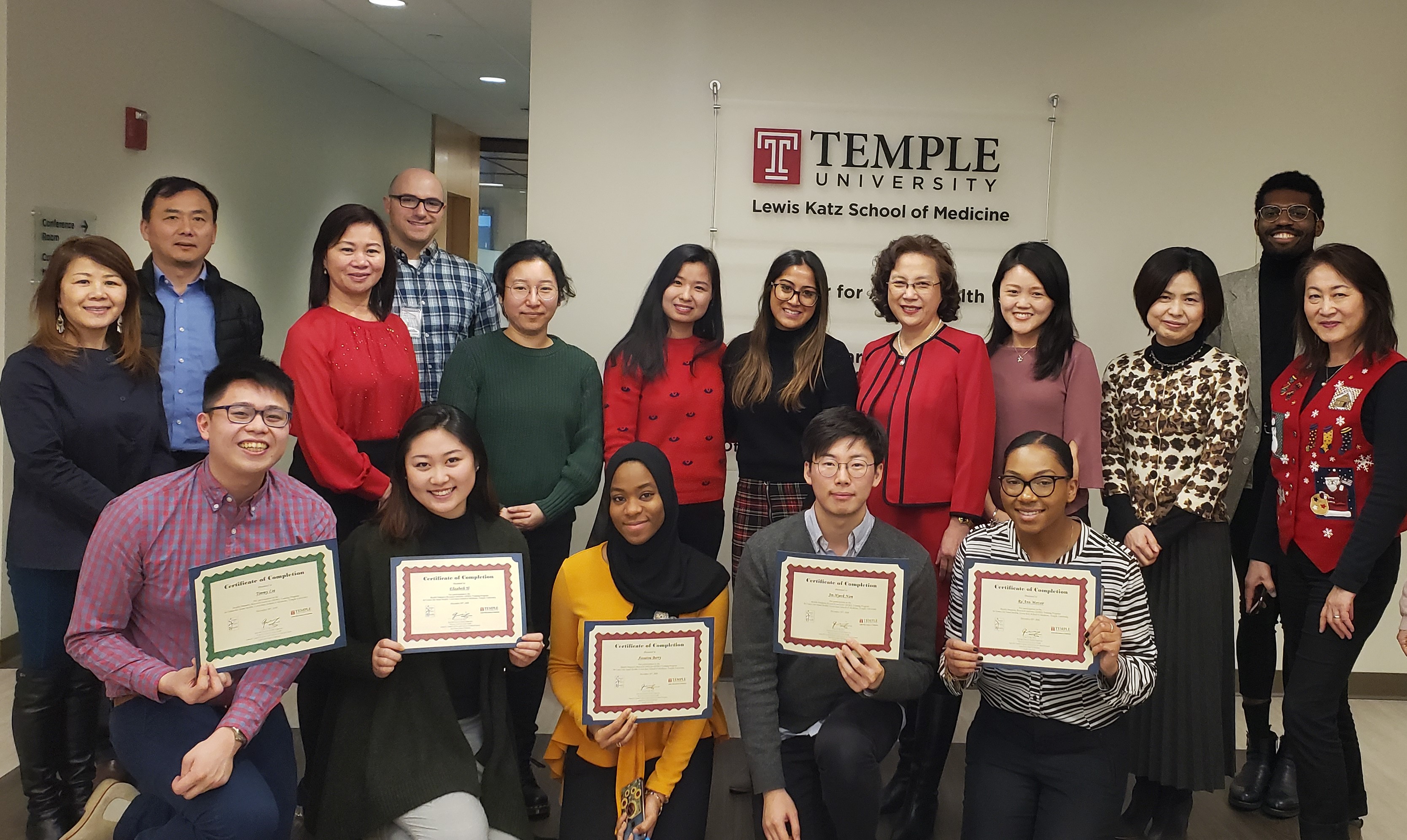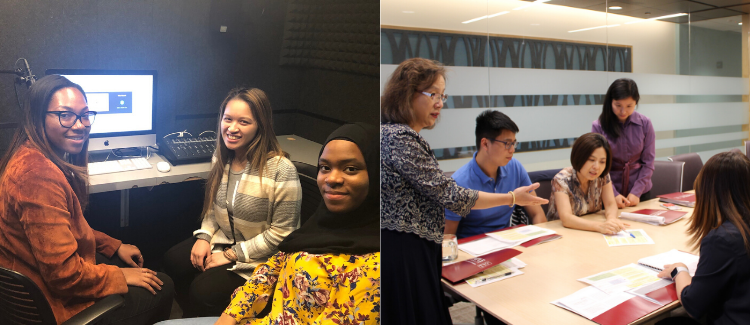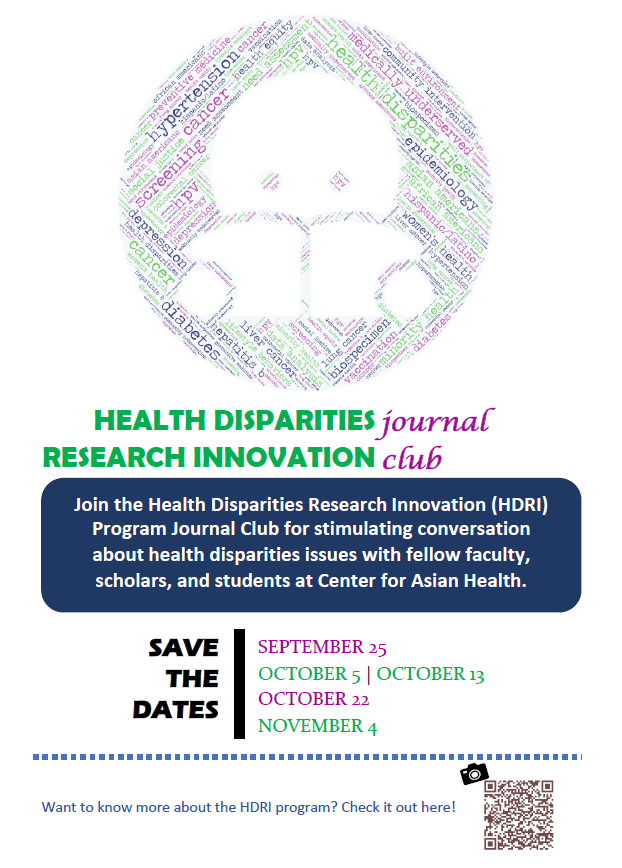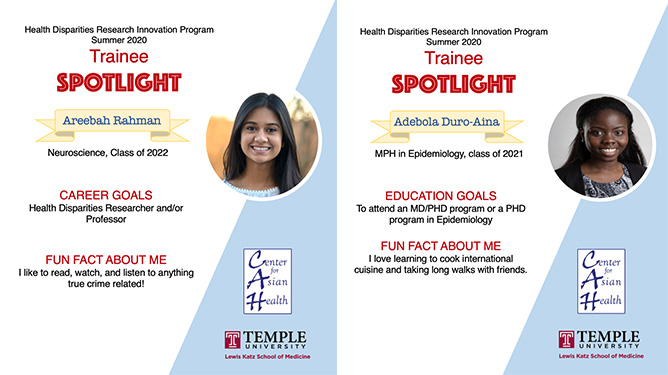Center for Asian Health provides training and mentorship opportunities for junior researchers, health professionals and community partners who are interested in health disparity issues among underserved and ethnic minority populations and communities.
Training and Mentorship for Underrepresented Early Stage Investigators and Junior Researchers
We provide health disparities research training and mentorship for early stage investigators and junior researchers in a broad range of health disparity issues. To date, Center for Asian Health have trained and mentored over 270 junior researchers. This training program has a dual track:
- Early Stage Investigator Training Track
- Junior Researcher Training Track
Health Disparities Research Innovation (HDRI) Program
The Health Disparities Research Innovation (HDRI) program provides research training opportunities for undergraduate, graduate/medical students, and health professionals from diverse disadvantaged background to gain relevant knowledge and research skills in addressing a broad range of health disparities issues experienced by racial/ethnic underserved minority populations. Through mentored-research training and hands-on experiences, HDRI trainees develop comprehensive understanding and competencies in community-based, multidisciplinary, and ethnically appropriate research approaches to reducing health disparities. Specifically, the HDRI trainees will have the opportunities to develop skills on various components of health disparities research, including IRB compliance, literature reviews, development of innovative health disparity research projects, community outreach/engagement, data analysis, conference presentation, and manuscript development. HDRI trainees will also have opportunities to network with researchers in multiple disciplines, community stakeholders, and funding agencies, and learn about/access to various opportunities in career advancement in the health disparity research field.
HDRI Trainee Highlights

Quotes from HDRI trainees:
“Participation in the HDRI program has strengthened my desire of pursuing a doctoral degree. I was able to be involved in a variety of health disparities research studies, which offered me great insight on applied research.”
“The HDRI Program has given me first-hand experience of population health research and helped me better understand the health needs of medically underserved communities.”
HDRI Trainees engage in community-based participatory research in cancer and chronic disease health disparities among underserved and underprivileged communities.

HDRI Seminars Learning Series
The HDRI Seminar Learning Series aims to foster research skill building, collaboration, communication, and resource sharing. The Series features faculty and staff from multiple disciplines in biomedical and health disparities research, as well as former and current HDRI trainees. Each month, HDRI trainees will attend one to two 60-minute live virtual seminars (also recorded). The series cover a wide range of topics to help HDRI trainees improve their research skills, develop critical thinking abilities, and network with research team members and their fellow trainees. Regular issues and topics covered in the seminar series include Diversity and Inclusion, Citation Management, Community Outreach 101, Basic Concepts in Biostatistics, Intro to R, and Career Trajectory in Health Disparities Research.
 HDRI Journal Club
HDRI Journal Club
The HDRI Journal Club is aimed at interpreting the scientific findings in health disparities research. We host virtual journal clubs in which HDRI trainees present critical reviews of population, behavioral, and translational biomedical research alongside faculty and staff of the CAH research team.
Our goals are to:
- Critically analyze and present the results and implications of health disparities literature.
- Generate lay summaries of the literature to inform the public of the scientific findings.
- Provide examples to scientists-in-training and the general public of how to adequately evaluate and draw conclusions from scientific studies.
- Foster communication and collaboration in the collegial environment.
At the HDRI Journal Club, we endeavor to create a space where everyone feels comfortable asking questions when they don’t understand, and others flex their teaching skills by answering these questions. For each meeting, an HDRI trainee will be the facilitator to (1) give a brief (8-10 minute) presentation to the group on the assigned reading using PowerPoint slides or other format, and (2) prepare 3 to 5 discussion/debate questions with the other trainee and CAH team members.
Youth Leadership Training Program
The Youth Leadership Training Program at CAH fosters mutual understanding, academic skills, and community engagement among high school scholars, learning and Interacting with peer mentors of undergraduate and graduate students in addressing issues related to health disparities. Through the program, students participate in workshops, community service activities, team building exercises, meetings with community leaders, and leadership development. Upon completion of the program, the students apply what they have learned to their academic learning, research, community engagement, and public service projects that serve needs in their communities.
Training and Capacity Building
- Clinical Trial Education for Health Care Providers Serving Underserved Populations (CME)
- Training Community Health Workers (CHWs)
- Patient Navigator Training (PNT)
- Training and Capacity Building for Community Partners (TCBCP)
- Grants for Innovative Projects (GIP)

